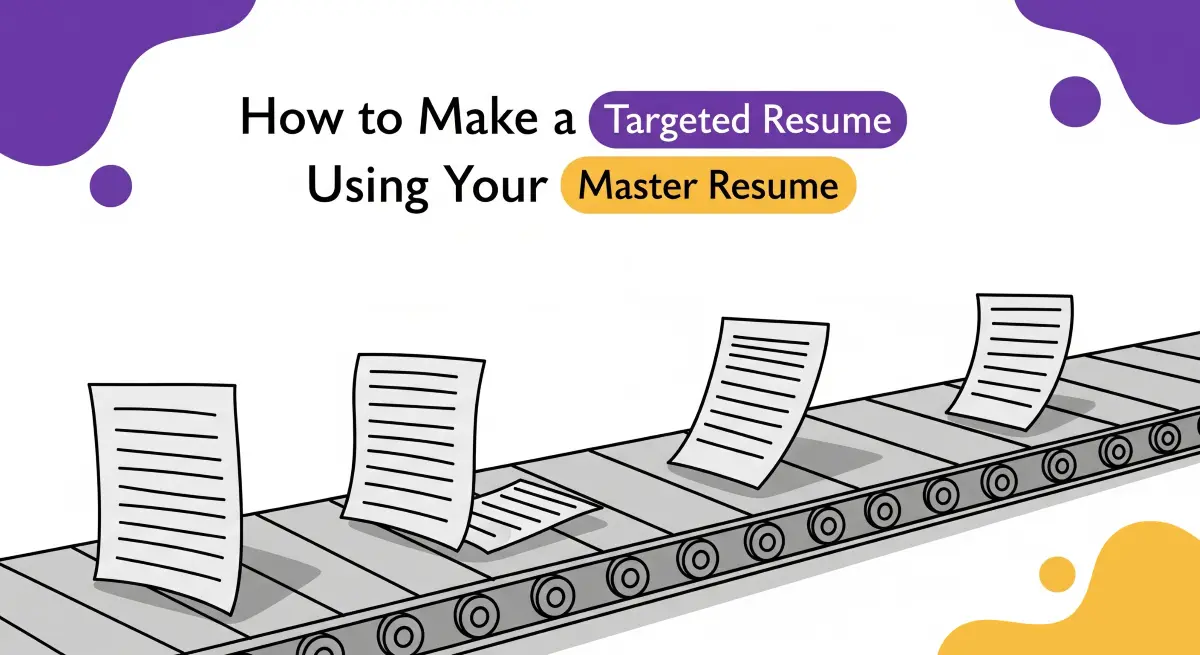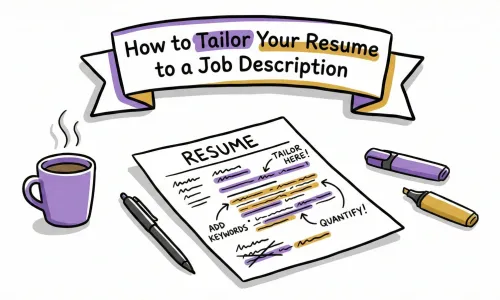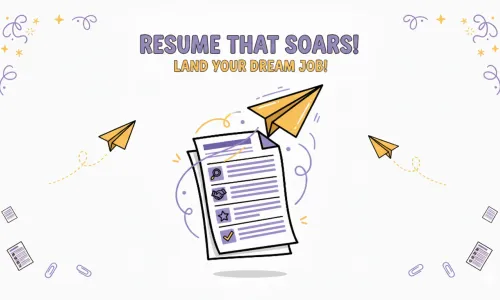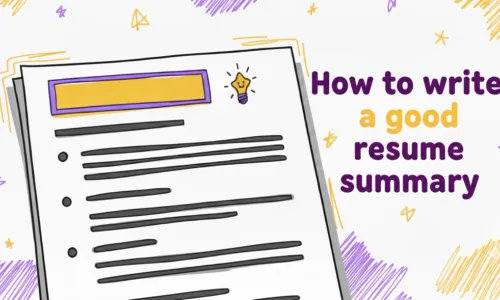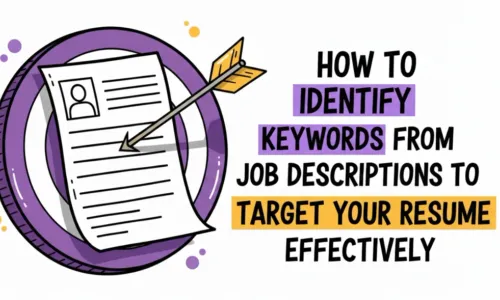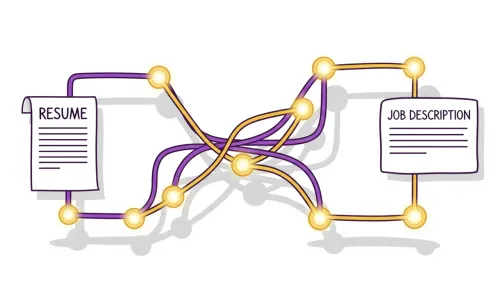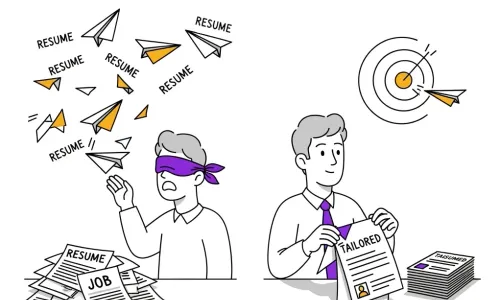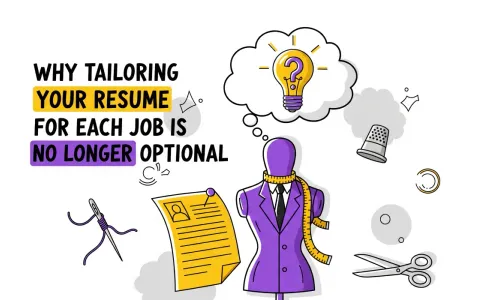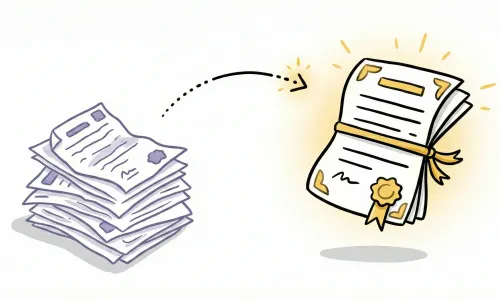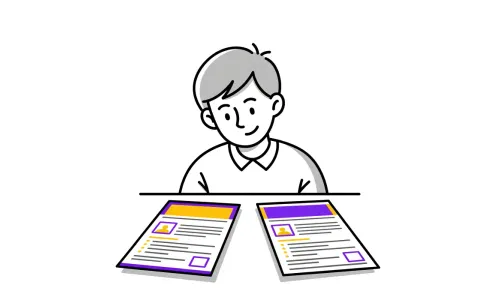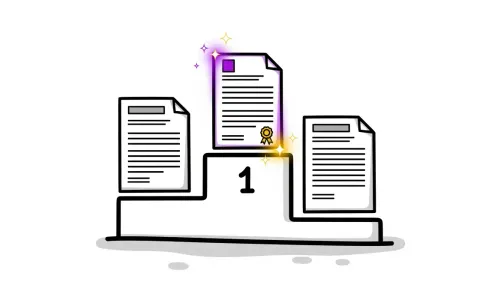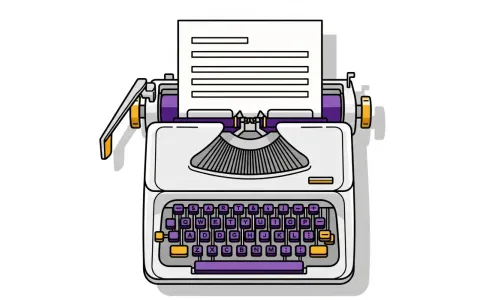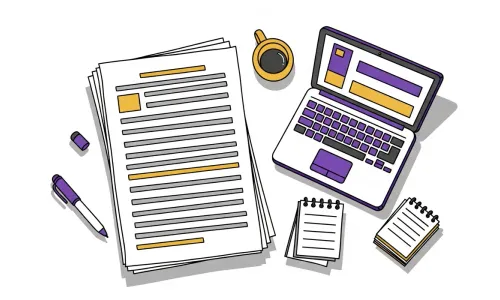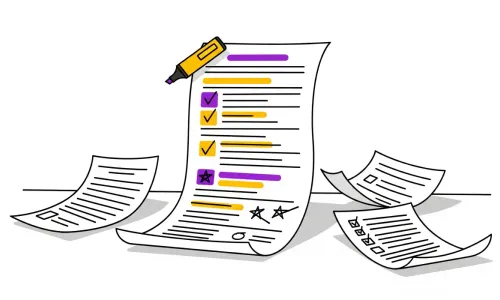Your Resume is a Marketing Document, Not a Historical Record
Did you know that the average corporate job opening attracts around 250 resumes? In a sea of applicants, standing out is not just an advantage; it's a necessity. Yet, many job seekers treat their resume like a comprehensive historical record, listing every task they've ever done. This approach, known as the "generic resume," is the fastest way to get lost in the pile. As we've discussed in our previous article, Why Most Resumes Are Invisible in 2025 (Even Good Ones), this is a critical mistake.
This is where the customized resume comes in. A tailored resume is a strategic marketing document, meticulously crafted to showcase your most relevant qualifications for a specific job. It speaks directly to the employer's needs, making it clear that you are the perfect fit for the role.
But creating a unique resume for every job application sounds exhausting, right? Not if you have a secret weapon: the master resume. This comprehensive document is the foundation from which you can quickly and easily build a powerful targeted resume for any opportunity that comes your way. In this guide, we'll show you how to create and leverage your master resume to make your job application process more efficient and effective.
What is a Targeted Resume and Why Does it Matter?
A targeted resume is a version of your resume that has been customized to highlight the skills and experience you have that are most relevant to a specific job. Instead of sending the same generic document to every employer, you are strategically tailoring your resume to align with the requirements of the job posting.
The Benefits of a Tailored Resume
Creating a targeted resume for each job application might seem like a lot of work, but the benefits far outweigh the effort:
- It gets you past the robots: Many companies use Applicant Tracking Systems (ATS) to screen resumes. These systems scan for specific keywords and phrases from the job description. A resume rich with these keywords has a much higher chance of passing this initial screening.
- It grabs the hiring manager's attention: Once your resume reaches a human, you have only a few seconds to make an impression. A targeted resume immediately shows the hiring manager that you have what they are looking for, making them more likely to read on.
- It shows you're a serious candidate: A customized resume demonstrates a genuine interest in the specific role and company. It shows that you've taken the time to understand their needs and how you can contribute, setting you apart from candidates who send a generic resume.
- It increases your chances of landing an interview: Ultimately, the goal of a resume is to get you an interview. A targeted resume is the most effective tool for achieving this, as it clearly communicates that you are a qualified candidate for the job.
| Feature | Generic Resume | Targeted Resume |
|---|---|---|
| Content | Broad list of all past roles, responsibilities, and achievements, regardless of relevance | Focused selection of experiences and achievements directly related to the job posting |
| Keywords | Uses general terms; may miss key phrases from the job description | Incorporates exact keywords and phrases from the specific job posting for ATS compatibility |
| Impact | Diluted impact-relevant and irrelevant information compete for attention | Strong, direct impact-every bullet point supports your fit for the specific role |
| Tone | Passive, historical record | Persuasive, marketing-focused |
| Employer Perception | Appears unfocused or “one-size-fits-all” | Shows deep understanding of employer’s needs and genuine interest in the role |
The Foundation: Your Master Resume
Now, you might be thinking that creating a customized resume for every job application sounds like a monumental task. This is where your master resume comes in. A master resume is a single, comprehensive document that contains your entire professional history.
What is a Master Resume?
Think of your master resume as your career database. It's a private document for your eyes only, where you store every detail of your work history, including:
- Every job you've ever had: Include company names, locations, job titles, and dates of employment.
- A detailed list of your responsibilities and accomplishments: For each role, write down everything you did, every project you worked on, and every achievement you unlocked. Use quantifiable data whenever possible.
- A complete list of your skills: This includes hard skills (like software proficiency) and soft skills (like communication and teamwork).
- All of your education, certifications, and training: List every relevant educational achievement and professional development course.
How to Create Your Master Resume
Creating a master resume is a one-time investment that will pay dividends throughout your job search. Here's how to do it:
- Brainstorm and document everything: Don't worry about length or formatting at this stage. The goal is to get all of your professional information down in one place.
- Organize your information: Structure your master resume with clear headings like "Work Experience," "Skills," "Education," and "Certifications." This will make it easy to find the information you need later.
- Write detailed, quantifiable bullet points: For each of your accomplishments, use the STAR method (Situation, Task, Action, Result) to create compelling, data-driven bullet points. The STAR method helps you structure your accomplishments as stories. For example, instead of saying "Managed social media accounts," you could say, "Increased social media engagement by 35% over six months by implementing a new content strategy (Result) by taking on the task of revamping the social media presence (Task) when the company was struggling to connect with its audience (Situation) through a new content strategy (Action)."
How to Write a Targeted Resume in 5 Steps
Once you have your master resume, creating a targeted resume is a breeze. Just follow these five steps:
Step 1: Analyze the Job Description
The job description is your cheat sheet. Read it carefully and highlight the key requirements, skills, and qualifications the employer is looking for. Pay close attention to:
- Keywords: Look for specific nouns and phrases that describe the role, responsibilities, and required skills.
- Company values: Research the company to understand its culture and values. This will help you tailor your resume's tone and content.
Step 2: Duplicate and Rename Your Master Resume
This may seem obvious, but it's a crucial step. Always create a copy of your master resume and rename it for the specific job you're applying for (e.g., "JohnDoe_ProjectManager_Resume"). This will prevent you from accidentally overwriting your master document.
Step 3: Tailor Your Professional Summary
Your professional summary is the first thing a hiring manager will read, so it needs to be compelling and relevant. Rewrite your summary to align with the specific role and company, highlighting your most impressive and relevant qualifications.
Step 4: Customize Your Work Experience
This is where your master resume really shines. Instead of rewriting your work experience from scratch, simply copy and paste the most relevant bullet points from your master resume into your targeted resume. Be sure to:
- Prioritize relevance: Choose the accomplishments that best demonstrate your ability to succeed in the target role.
- Use the employer's language: If the job description asks for a "team player," use that exact phrase in your resume.
Step 5: Refine Your Skills Section
Finally, review your skills section and make sure it reflects the requirements of the job.
- Include a mix of hard and soft skills: The job description will likely mention a combination of technical skills and interpersonal qualities. Make sure your resume reflects both.
- Be specific: Instead of just listing "project management," you could mention specific methodologies like "Agile" or "Scrum."
Targeted Resume Examples
Let's look at a practical example of how to transform a generic resume bullet point into a targeted one.
Job Description Keyword: "Experience with social media marketing and content creation."
Generic Resume Bullet Point:
- "Responsible for managing the company's social media accounts."
Targeted Resume Bullet Point:
- "Grew social media engagement by 35% in six months by developing and implementing a data-driven content strategy across Facebook, Twitter, and Instagram."
Here's another example for a career changer:
Job Description Keyword: "Customer service experience"
Generic Resume Bullet Point (from a retail job):
- "Assisted customers with their purchases."
Targeted Resume Bullet Point (for an office assistant job):
- "Resolved customer inquiries in a high-volume retail environment, demonstrating strong communication and problem-solving skills applicable to an office setting."
See the difference? The targeted bullet point is specific, quantifiable, and directly addresses the language used in the job description.
Here's a snippet of what a targeted resume for a Project Manager role might look like:
Professional Summary
A results-oriented Project Manager with over 8 years of experience leading cross-functional teams to deliver complex projects on time and within budget. Proven ability to manage project lifecycles from initiation to completion, utilizing Agile and Scrum methodologies to drive efficiency and stakeholder satisfaction.
Work Experience
Senior Project Manager | ABC Corporation | 2018 - Present
- Led a team of 12 in the successful launch of a new software product, resulting in a 15% increase in market share.
- Managed a portfolio of 5-7 concurrent projects with budgets ranging from $50,000 to $1 million.
- Implemented a new project management system that improved team productivity by 25%.
The Reztune Advantage: Your Secret Weapon for a Targeted Resume
Creating a targeted resume for every job application is a proven strategy for success, but it can be time-consuming. That's where Reztune comes in. Think of it as your secret weapon in the job search.
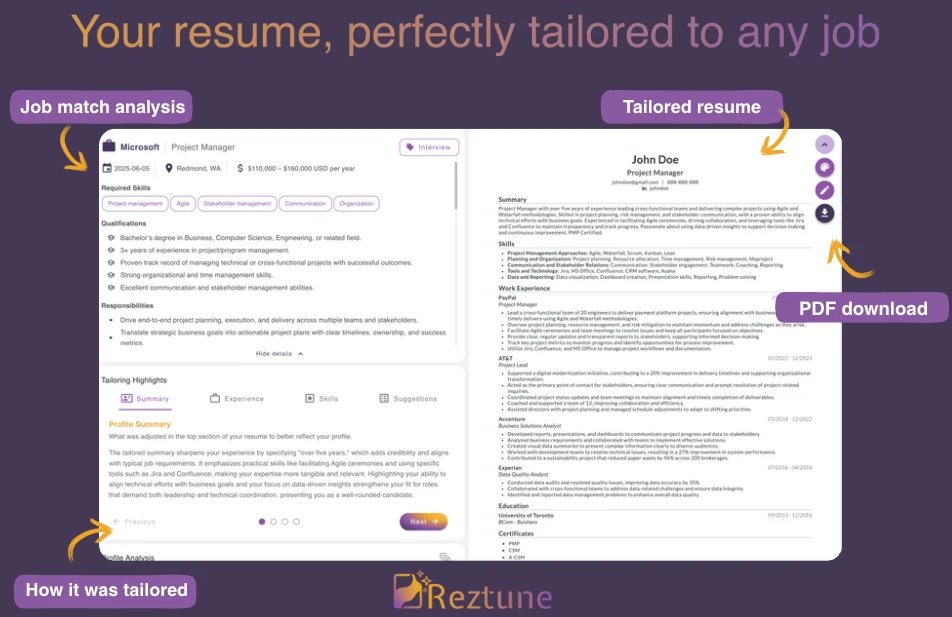
Reztune is an AI-powered resume builder that automates the process of creating a targeted resume. Our platform analyzes any job description, identifies the key skills and keywords, and then rewrites your resume to perfectly match the employer's requirements. With Reztune, you can:
- Create a perfectly targeted resume in seconds: Our AI does the heavy lifting, so you can focus on preparing for your interview.
- Beat the ATS: We use industry-leading, ATS-optimized templates to ensure your resume gets seen by a human.
- Tailor your resume with one click: No more manual copying and pasting. Reztune makes it easy to create a customized resume for every application. To learn more about how our technology works, check out our How It Works page.
Stop spending hours tailoring your resume and let Reztune do the work for you. Sign up for a free trial today and experience the power of an AI-powered targeted resume.
Conclusion: A Targeted Resume is a Winning Resume
In today's competitive job market, a generic resume is no longer enough. To stand out from the crowd and land the job you deserve, you need a resume that speaks directly to the employer's needs. By creating a comprehensive master resume and using it to build a targeted resume for each application, you can significantly increase your chances of success.
Pair your targeted resume strategy with an optimized LinkedIn profile. Learn how to apply data science insights to improve your LinkedIn visibility and maximize your chances of being discovered by recruiters.
Key Takeaways:
- A targeted resume is customized for a specific job.
- A master resume is a comprehensive document with all your work history.
- Analyze the job description for keywords.
- Tailor your professional summary, work experience, and skills sections.
- Use a tool like Reztune to automate the process.
Ready to take your resume to the next level? Try Reztune today and experience the power of a perfectly targeted resume. Our AI-powered platform makes it easy to tailor your resume to any job description and land more interviews. Don't just apply for your dream job - get hired.
Frequently Asked Questions
How long should a targeted resume be?
Ideally, a targeted resume should be one page long. However, if you have extensive experience that is relevant to the job, a two-page resume is acceptable.
Should I have a different resume for every job?
Yes, you should create a targeted resume for every job you apply for. This will significantly increase your chances of getting an interview.
What if I don't have all the qualifications listed in the job description?
That's okay! Few candidates will meet 100% of the qualifications. Focus on highlighting the qualifications you do have and emphasize your transferable skills. For more answers to your questions, visit our FAQ page.
How do I choose the right resume template?
When you make a targeted resume, the template you choose should be clean, professional, and easy to read. Look for a resume template that allows for clear section headings and bullet points. Most importantly, ensure your resume template is ATS-friendly to get past the initial screening.
What should I include in my resume summary?
A resume summary is a brief 2-3 sentence overview of your professional background and skills. For a targeted resume, your resume summary should be tailored to the specific job, highlighting the qualifications that make you a great fit for the role.
How can I create targeted resumes more efficiently?
To create targeted resumes quickly, start with a master resume that includes all your work history and skills. Then, for each job application, copy the master resume and delete any information that isn't relevant to the specific job posting. A resume tool can also help you streamline this process.
Is it important to target my resume for a career change?
Yes, it's especially important to write a targeted resume when you're making a career change. This allows you to showcase your transferable skills and explain how your past experience is relevant to the new role you're applying for. Learning how to write a targeted resume for a career change can be a game-changer in your job search.
Should I include volunteer work on my resume?
If your volunteer work is relevant to the job you're applying for, you should definitely include it on your targeted resume. This can be a great way to demonstrate your skills and commitment, especially if you have limited paid work experience.

